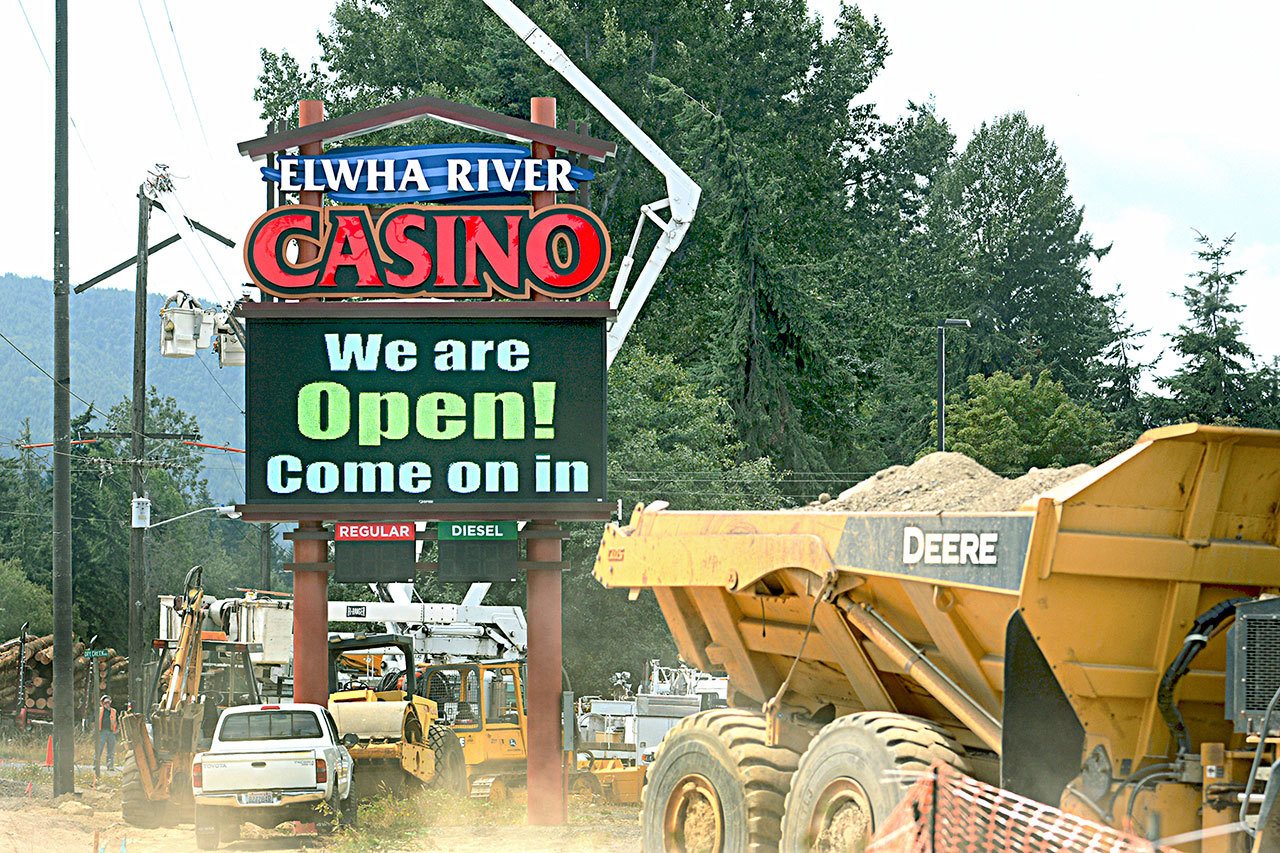PORT ANGELES — The Lower Elwha Klallam tribe is continuing to expand its economic reach in the area, which includes expanding the tribe’s property on the corner of U.S. Highway 101 and Dry Creek Road, said Michael Peters, the tribe’s CEO.
Crews are working now to expand the intersection and the tribe has hopes of expanding services at Lower Elwha Food &Fuel, which opened in May, Peters told a packed crowd at a Port Angeles Business Association meeting Tuesday morning.
“We have strong hopes — and we know already because we are ahead on our projections in sales — to talk about expanding that property,” he said.
Expansions would likely start off simple, he said. An addition he said the convenience store needs soon is hot food.
“We need to address hot food,” he said. “We have customers saying we need to have chicken, jo-jos, things like that.”
The Elwha River Casino currently provides deli sandwiches for the store.
Once improvements are made to the intersection, the tribe might look at increasing the number of gas pumps.
The new gas station already is getting a backlog of vehicles during peak hours, he said.
Among the improvements to Highway 101 is a deceleration lane for westbound traffic to turn right onto Dry Creek Road.
There will also be right and left turn lanes from Dry Creek onto Highway 101, he said.
The approximately $500,000 project is completely funded by the tribe, he said. The intersection expansion must be finished by Oct. 15, but will likely be finished in September, he said.
The tribe has 17 acres of trust land at the intersection it has yet to decide what to do with, he said.
“What it will be, we don’t know,” he said. “We are having those discussions.”
The tribe has had “a lot” of discussions where the optimal spot for the Elwha River Casino would be, he said.
Moving the casino has been brought up in conversations, but Peters said that would be a long and drawn-out legal process.
“We haven’t begun that process, other than having internal discussions,” he said.
He said the Elwha River Casino sign erected at the intersection is to let motorists on Highway 101 know the casino is nearby.
Wellness center
The tribe is now discussing what the next building on the Lower Elwha Health Clinic property will be, he said.
There have been discussions about a “wellness campus,” which would be on the 40-acres of trust land.
Those discussions started within the last couple of weeks and are preliminary, he said.
Among the possibilities for the building would be mental health or chemical dependency services, he said.
“We have a lot of different things that could move into there,” he said. “We’re going to move right along with the discussions.”
At this point there is no timeline for the project.
The Elwha Justice Center has seen major improvements recently, he said.
The tribe recently demolished the old 3,000-square-foot Lower Elwha Klallam Tribal Police Station at the corner of Highway 101 and Dry Creek Road, then moved the center to a new 10,000-square-foot facility at 341 Spokwes Road.
The tribe moved into the new facility in early July.
There will be an open house for tours of the new facility in August or September, he said.
Tse-whit-zen
The tribe is close to a decision on what it will do with the Tse-whit-zen site, a burial ground on what is now Marine Drive on the Port Angeles waterfront, which was discovered in 2003.
“We’re in the process of the community addressing what should be done at that location,” he said. “We hope to complete that process in the next three or four months and we’ll start to develop some conceptual drawing for construction to occur at that location.”
There have been discussions as to which parts of the site should be open to the public and what should be a memorial for tribal members, he said.
The 2,700-year-old Tse-whit-zen village site on Port Angeles Harbor was discovered while digging a graving yard in 2003.
Many of the 80,000 relics found there remain at the Burke Museum at the University of Washington, but they progressively are being returned to the tribe, which displays chosen items at the heritage center.
One of the ideas for the site is for there to be a public curation facility, though no decisions have been made yet, he said.
________
Reporter Jesse Major can be reached at 360-385-2335, ext. 5550, or at jmajor@peninsuladaily news.com.
